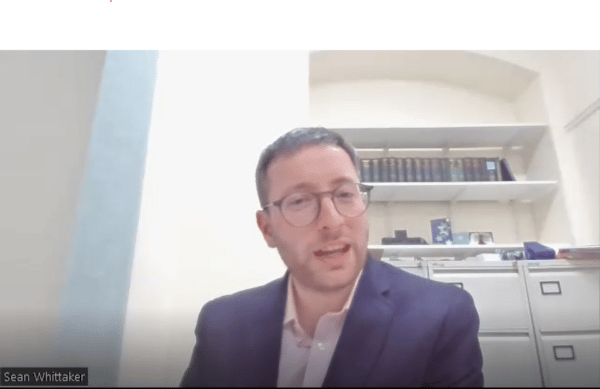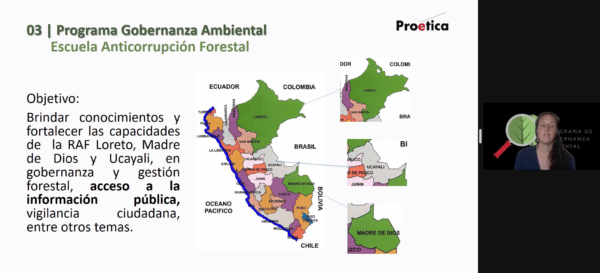22 December 2022 –
Access to public information is an essential part of the fight against corruption: it is one of the fundamental pillars of any corruption prevention strategy. As a tool for holding governments to account, monitoring government performance, and uncovering corrupt acts, it is an indispensable tool in a corruption fighter’s repertoire. As the right of access to information has been anchored into the anti-corruption agenda, it has also grown in importance in the environmental rights and protection movement. Environmental activists worldwide, but especially in Latin America and the Caribbean, are including access to information requests in their advocacy and are actively advocating for more proactive transparency to determine both the true scope of the ecological and environmental impact of human beings and find ways to mitigate and prevent them.
Guaranteeing the right to access environmental information has become a fundamental component of the fight for environmental rights and has understandably intertwined itself with the fight against corruption. Corruption in areas such as natural resource governance, public procurement, energy management, and land registry can be uncovered and prevented if citizens, journalists and NGOs have adequate access to environmental information.
UNCAC Coalition members and affiliates from Latin America and the Caribbean discussed the topic of access to information and the environment at its 9th Regional Meeting in mid-December. This event provided an avenue to share past experiences, innovations and ideas to strengthen this right in the region, and about advocacy strategies at the national and regional level moving forward.
Access to information in the UNCAC
Access to information is a human right and is enshrined in several human rights conventions and framework documents which countries in Latin America and the Caribbean are beholden to. The UN Convention against Corruption (UNCAC) recognizes access to information as a cornerstone of an anti-corruption strategy: article 10 the UNCAC requires States Parties to take measures to increase the transparency of their public administrations, including by providing access to information on “the organization, functioning and decision-making processes of its public administration”. Article 13 establishes a relation between citizen participation and access to information, committing States Parties to ensure public participation by ensuring “effective access to information” and respecting, promoting and protecting “the freedom to seek, receive, publish and disseminate information concerning corruption.”
Yet, there is no explicit mention of the right to access environmental information within the UNCAC. Likewise, there are no complimentary proclamations or commitments calling for greater transparency and access to information on environmental matters at the UNCAC level, despite calls for strengthening transparency and information to enable public participation in the aforementioned resolution. Within the framework of the UNCAC, Resolution 8/12 of the Conference of the States Parties was the only instance where corruption was linked to environmental crimes in a high-level public forum.
The UNCAC Coalition’s Working Group on Environmental Crime and Corruption has repeatedly included calls for the strengthening of the right to access to environmental information in numerous documents submitted to the UN and UNCAC States Parties.
Is Latin America and the Caribbean at the vanguard access to environmental information?
Access to environmental information has become a fundamental state policy in Latin America and the Caribbean since the Escazú Agreement, signed in March 2018 by 24 countries and, so far, ratified by 13 countries in Latin America and the Caribbean. Antigua and Barbuda, Argentina, Belize, Bolivia, Brazil, Chile, Colombia, Costa Rica, Dominica, Dominican Republic, Ecuador, Granada, Guatemala, Guyana, Haiti, Jamaica, Mexico, Nicaragua, Panamá, Paraguay, Perú, San Vicente and the Grenadines, Saint Kitts and Newis, Saint Lucia and Uruguay have both signed and ratified the Agreement. The agreement sets a minimum standard of proactive transparency and establishes requirements for states to provide environmental information when requested by citizens.
In past Regional Meetings on access to information, members and affiliates from Latin America and the Caribbean have stressed that while the region has sound legal frameworks that guarantee the right to access to information, implementation of laws and procedures curtails access in practice. Regarding access to environmental information, debates revolve around the availability, production and transmission of environmental data to hold states accountable, around the structures that guarantee the right of access to information in environmental matters, and around systems of standardization and dissemination of environmental information.
Access to environmental information from a global perspective
 Dr. Sean Whittaker, Lecturer at the University of Dundee and executive director of the Center for Freedom of Information, shared his thoughts about the opportunities and challenges for access to information and the environment in the Latin American and Caribbean region. Dr. Whittaker leads a project called Uncovering the Environment, which aims to study policy innovations and the current state of affairs of environmental transparency worldwide.
Dr. Sean Whittaker, Lecturer at the University of Dundee and executive director of the Center for Freedom of Information, shared his thoughts about the opportunities and challenges for access to information and the environment in the Latin American and Caribbean region. Dr. Whittaker leads a project called Uncovering the Environment, which aims to study policy innovations and the current state of affairs of environmental transparency worldwide.
The lecturer noted in his presentation that the Aarhus and Escazú agreements which aim at setting minimum regional standards for environmental transparency in Europe and the Americas, respectively, are useful tools for NGO activists and journalists. Nevertheless, the implementation of access to information laws is key for effective transparency on environmental matters. His research has shown that many countries with similar freedom of information laws provide information to drastically differing degrees, hinging on their attitudes to environmental matters.
Dr. Whittaker enumerated some of the challenges that freedom of information advocates face in regards to environmental information. First, proactive disclosure of environmental information tends to lead to more access to information requests. These requests are not only more in number but tend to be more specific when environmental information is already disclosed. This situation may lead governments to be more reticent about publishing information proactively, given that it would mean more administrative pressure on their agencies. Second, exceptions to access to information laws in regards to the environmental information are significant obstacles in countries with a poor record of responding to access to information requests. He noted that even the Escazú Agreement gives States leeway to create exceptions to providing information. Third, from his research, Dr. Whittaker has found that the lack of knowledge or expertise of the general public on environmental matters limits the effective use of existing access to information legislation.
To conclude the presentation, the lecturer highlighted that all of these challenges can be counteracted by changing public and official attitudes to access to information and building the capacity of organizations and activists that can make use of the right to environmental information.
Sean Whittaker’s presentation is available on Youtube here.
Engaging local communities to combat corruption in forestry
Andrea Meier, specialist within the Enviromental Governance programme Proética, from Peru, shared the organizations experiences developing the Red Anticorrupción Forestal (Anti-corruption Forestry Network,). The network is made up of local civil society organizations and indigenous activists and other NGOs with national reach. Proética runs “anti-corruption forestry schools” where network participants are taught about forestry corruption and are provided with tools to monitor and prevent this type of corruption.
Access to information is central to the activities of the Anti-corruption Forestry Network. Over the past two years they have used access to information requests to monitor illegal forestry by supervising the amount of forestry licences given and the integrity of licencing processes. The Network has also published an evaluation of the forestry sector and manufacturing industries concentrating on wood products. The key tool for this evaluation were access to information requests to relevant ministries and local inspection agencies. Finally, the Network also studied how organizations and activists were chosen by government agencies for public environmental consultations.
 Through the work of the Anti-corruption Forestry Network, Proética has been able to both evaluate the state of illegal forestry in Peru as well as gauge the level of access to information that exists around forestry issues at the national and local level of government. While the Network currently operates in three municipalities, Proética hopes to expand the network to other communities where forestry represents a major source of income and to areas where protected natural areas and forestry coexist.
Through the work of the Anti-corruption Forestry Network, Proética has been able to both evaluate the state of illegal forestry in Peru as well as gauge the level of access to information that exists around forestry issues at the national and local level of government. While the Network currently operates in three municipalities, Proética hopes to expand the network to other communities where forestry represents a major source of income and to areas where protected natural areas and forestry coexist.
How do anticorruption watchdogs engage with the right to access to environmental information?
The regional meeting ended with a general discussion about how anti-corruption NGOs engage with environmental information in their work.
- Representatives from Mexiro (Mexico) shared their experience working with indigenous communities in rural Mexico on environmental governance. Their experience shows that accessing information on natural resources is difficult due to overlapping jurisdictions in regards to the natural resources present on a piece of land. Federal, state and local governments all regulate aspects of the environment, many times through various agencies, so pin-pointing which institution has the information they are requesting is difficult. Regional meeting participants also discussed the security aspect of this type of work, noting that many of the communities they work in have a heavy military presence, which also limits the requests they can make due to security exceptions present in their laws.
- Representatives from CIPPEC (Argentina) spoke about how the organization has worked on access to information for years, but has only recently found through their work with state-owned enterprises and public procurement agencies, that they are able to monitor environmental governance and civil society participation in public environmental consultations with the use of access to information requests. In 2023, they will be launching a project to understand each state-owned company’s environmental record.
- Representatives from Transparencia por Colombia (Colombia) shared their organization’s experience working with WWF to identify integrity risks in state regulators and state environmental agencies. Their goal is to be able to better identify risk areas for environmental crimes. Thus far, they have found a low response rate to access to information requests, partly due to bad coordination between state organizations.
Conclusions and way forward
Access to environmental information is a relatively new dimension of access to information advocacy, so a general conclusion that arose from the Regional Meeting was that there is much more to be done in this field. The technical complexities of environmental information, overlapping jurisdictions on environmental matters, and a lack of openness from government agencies are clear obstacles for organizations working in the region.
The NGOs present at the Regional Meeting noted the importance of having an Environmental Crime and Corruption working group to advance these topics, but also highlighted the need to work more with environmental activists to find out what gaps exists between the right to access environmental information and the quality and quantity of information they receive.
If you are a civil society activist from Latin America and the Caribbean and would like to become involved, please contact our Regional Coordinator Iñaki Albisu Ardigó at inaki.albisu@uncaccoalition.org.



